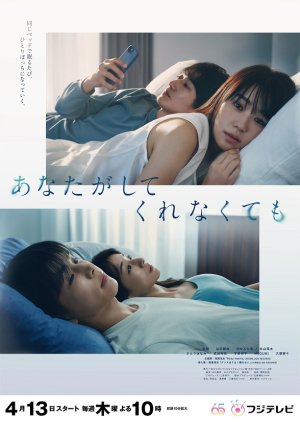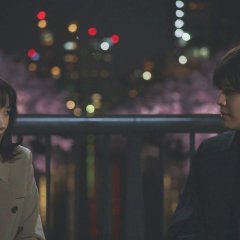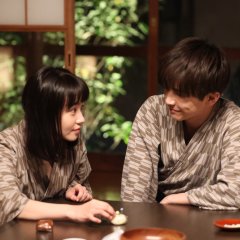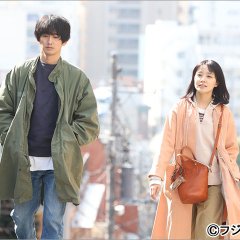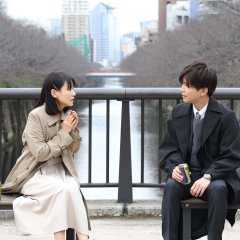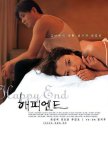- Français
- Español
- English
- magyar / magyar nyelv
- Titre original: あなたがしてくれなくても
- Aussi connu sous le nom de: Even if You Don’t Do It
- Réalisateur: Nishitani Hiroshi
- Scénariste: Okazaki Satoko
- Genres: Romance, Drame
Où regarder Anata ga Shitekurenakute mo
Subscription (sub)
Distribution et équipes
- NaoYoshino MichiRôle principal
- Nagayama EitaYoshino YoichiRôle principal
- Iwata TakanoriNiina MakotoRôle principal
- Tanaka MinamiNiina KaedeRôle principal
- Sato HonamiMishima YuikaRôle Secondaire
- Takeda RenaKitahara HanaRôle Secondaire
Critiques
Cette critique peut contenir des spoilers
Interesting exploration into marriage without intimacy, before nosediving into absurdity.
This series took an interesting look at marriage and how things can break down over a lack of communication and intimacy.Considering how things went for the two couples profiled in this, I thought their marriages had reached the point of no return. Makoto's wife was more interested in her career than having a family, and in turn denied him emotional and physical intimacy.
And Michi's husband did not want kids at all and rather work a mediocre job and play video games, while at the same time denying her emotional and physical intimacy for more than two years. In the mist of all that he decided to physically cheat on her with his colleague and had little remorse for it until she (Michi) started to pull away from him.
Makoto and Michi became emotionally involved due to their loveless marriages and ultimately divorced their spouses, but break up with each other after the divorces. Still they continue on with their lives. Makoto working on growing his career and Michi doing the same, but also learning how to stand on her own. I thought the story ended in a good place at the end of episode 10 and should've stopped there. I didn't understand why another episode was needed.
Imagine my surprise when the main couples spent all of episode 11 ignoring what had destroyed their relationships in the first place, some of which were things that could not be overcome i.e. one person in the relationship wanting kids while the other didn't and extreme selfishness by one party in the relationship. Only to get back together in the end.
It was good to see Michi try to work on herself. Thus, it was extremely disappointing to see her reunite with Yo just because he told her he loved her. SMH. Very elementary and immature of her. This guy never worked for their relationship, except when that work would result in him getting what he wanted from her. Their relationship was never about them or even her. It was always about him. Moreover, he was unambitious, emotionally stunted and extremely selfish. In no way a match for what she envisioned for her life. It made absolutely no sense that he'd suddenly decide to leave the coffee shop and open his own. Honestly, I don't know how the shop he was working for stayed in business when there was never any customers in there.
This had to be one of the worst series I've ever wasted time watching and it was all due to the ending. I honestly had no investment in Michi and Makoto. I didn't care whether they ended up together or not.
However, I did think enough had been shown to logically conclude that both of their marriages were irreparably damaged and that they needed to move on. What a cop out to have them a) still interacting with each other, not just their exes, but the exes of their former "lovers" and b) to have the suddenly realize they belong together and reunite with their spouses. It made no sense whatsoever. Overall, the only good thing about this was the acting, which was actually pretty good. That aside though, this is not a series I would recommend and is obviously not worth a rewatch.
Cet avis était-il utile?

Insightful content with average execution
Don’t be deceived by the impression the first couple of episodes make, this is not a mundane, trope-filled series. On the contrary, it unfolds a complex examination of marriage. The drama places adultery in the wider context of already fractured relationships and explores it as a symptom not a cause.It rings the changes and thoroughly deals with all sides of the situation, identifying every nuance and plunging into everyone’s complex and conflicted feelings. The excuses, evasions and dishonesty, not only with their partners, but with themselves. The selfishness and procrastination that accompany the slow move towards emotional honesty, self knowledge and self acceptance. It leaves no stone unturned, no nuance uninvestigated. To its credit, I often thought that I knew where it was headed, only to become unsure again. Very much like the real life process of negotiating relationships.
And this is its strength. It is a mature reflection on the fragility and messiness of relationships which can probably only be fully appreciated by people who have some life experience.
However, with so much to pack in, there is little subtlety in the way the next angle is manufactured. We shift from one perspective to the next like factory processes on a conveyor belt and the final episode is one conveyor belt too far imo. You can see the spreadsheet with the plot points divided up into the number of episodes and the flow charts for the character developments. The writing is not quite subtle or smooth enough to be wholly convincing.
Having said that, there is so much material that it could have benefitted from a longer unfolding. This is really not something I say very often, normally I want to get in there with the blue pencil and drastically prune things back. But only eleven, forty-five minute episodes cramps its style. Although I don’t think the writer (Okazaki Satoko) is top notch, I think she has enough skills to have eased the flow if she had been given a longer opportunity.
The performances are mixed. For me, Nao and Nagayama Eita make a much more convincing pairing than the other couple. There is greater transparency to their internal emotions. I found Iwata Takanori unconvincing. The right expression is on his face but the emotion isn’t there in his guts.
With so much opportunity to overplay the melo, it is a credit to the director (Nishitani Hiroshi) that he underplays it in true Japanese fashion. As a result the pathos of the situation is enhanced. But it could have been more so if he had made more use of silence and pauses. Possibly the pressure of time disallowed this.
There’s some inexcusably bad editing, where the screen flashes black in the middle of a scene, possibly where ad breaks have been sloppily removed. And whoever edited the soundtrack should be demoted. Too often it was too loud, too obvious, too repetitive, too random and so noticeably truncated that it was like a shock to the system.
All the way through I was wavering between giving this 7.5 or 8, but in the end, even though the insightful content merited the 8, the execution disappointed.
What my rating means: 7+ A watchable drama, but nothing exceptional. Good enough to qualify for the race, but finished with the pack. The sort of thing that promises more than it delivers.
Cet avis était-il utile?

